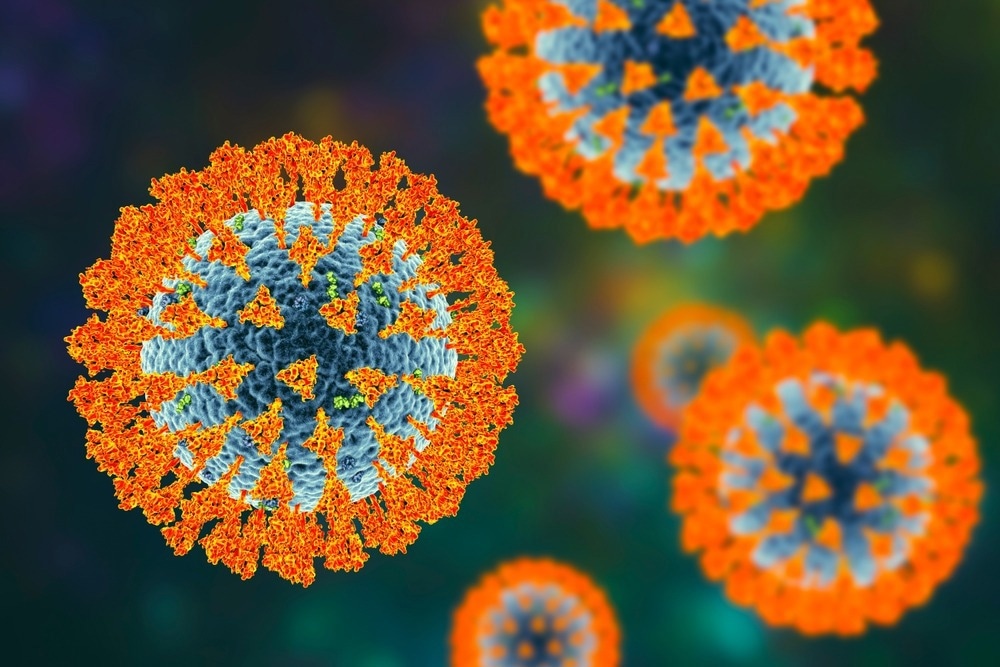In a recent JAMA Network Open study, researchers systematically review existing data to assess the incubation periods of different severe acute respiratory syndrome coronavirus 2 (SARS-CoV-2) variants of concern (VOCs).
Previous studies have estimated the mean SARS-CoV-2 infection incubation period; however, the reported incubation estimates vary based on the sample size, study design, data extraction period, and nations where the studies were conducted. Additionally, the incubation periods of SARS-CoV-2 Delta and Omicron VOCs differ from that caused by the ancestral Wuhan-Hu-1 or wild-type (WT) strain.

Study: Incubation Period of COVID-19 Caused by Unique SARS-CoV-2 Strains A Systematic Review and Meta-analysis. Image Credit: Kateryna Kon / Shutterstock.com
About the study
In the present study, researchers determined the overall pooled COVID-19 incubation period, as well as the incubation periods of infections by different SARS-CoV-2 VOCs. The goal of this study was to obtain information that could be used to guide COVID-19 prevention and control strategy- and policy-making processes, as well as reduce SARS-CoV-2 transmission.
Data were searched from the EMBASE, ScienceDirect, and PubMed databases between December 1, 2019, and February 10, 2022, using keywords such as SARS-CoV-2, novel coronavirus, COVID-19, 2019-nCoV, incubation, or incubation period. There were no language or publication status restrictions, as long as abstracts were available in English.
The main study outcome was the average estimates of SARS-CoV-2 incubation periods by different SARS-CoV-2 VOCs. Original studies assessing the COVID-19 incubation period., which is defined as the duration between SARS-CoV-2 infection and symptom onset, were included in the analysis. Records were excluded if they were editorials, reviews, letters to editors, perspective articles, commentaries, duplicate articles, and articles with overlapped sample populations.
The review was performed in accordance with preferred reporting items for systematic reviews and meta-analyses (PRISMA) guidelines. Three reviewers performed data extraction independently in March 2022.
Data on the first author’s name, study region, duration for collecting data, sample population characteristics, type of SARS-CoV-2 VOC, and COVID-19 incubation period estimates were obtained from the included studies.
The quality of the included studies was assessed independently by two researchers using the Newcastle-Ottawa scale (NOS) and random effects modeling, with the DerSimonian and Laird estimation method used for the meta-analysis.
Study findings
A total of 5,012 records were identified in the databases, of which only 142 studies comprising 8,112 COVID-19 patients were considered for the final quantitative or meta-analysis. Duplicated records, title and abstract records, ineligible full-text articles, records with other prime outcomes, and records with unavailable statistical data were excluded from the analysis.
Of those included, 45, 82, and 15 studies were of strong, moderate, and weak quality, respectively. About 76% of the included studies were conducted in China, with 66% published between January and March 2020.
Six, four, and three studies were conducted in South Korea, France, and Japan, respectively, whereas two studies were conducted in Singapore, India, Vietnam, and Australia. About 84% of the studies comprised patients the ancestral WT strain infections, 3.5% included patients with different strain infections, and 7.7% included patients with unknown strain SARS-CoV-2 infections.
The included studies were substantially heterogeneous (I2 = 99%); however, the researchers did not report any publication bias in the studies. The standard error was also very low for all except one of the included studies.
The overall pooled COVID-19 incubation period was 6.6 days and ranged from 1.8 and 18.9 days. Comparatively, the incubation periods of SARS-CoV-2 infections caused by the Alpha, Beta, Delta, and Omicron VOCs were documented in one, one, six, and five studies, respectively.
The average incubation periods of SARS-CoV-2 infections were five, 4.5, 4.4, and 3.4 days for those caused by the Alpha, Beta, Delta, and Omicron VOCs, respectively. The average COVID-19 incubation periods were 7.4 days among individuals over the age of 60 years and 8.8 days among children younger than 18 years, 7.0 days among individuals with non-severe COVID-19, and 6.7 days among severe COVID-19 patients.
COVID-19 incubation periods among elder individuals may be longer than the pooled incubation period due to slower and weaker type 1 interferon (IFN) immunological responses among elders. In addition, the lack of fever responses, non-specificity of illness presentations, and the presence of multiple comorbidities may contribute to delayed COVID-19 detection among older adults.
COVID-19 incubation periods were shorter than the pooled period of COVID-19 incubation in children. This may be attributed to the fact that SARS-CoV-2-infected children typically present with mild COVID-19 symptoms without classical pulmonary pneumonia phenotype. Thus, COVID-19 symptoms could be confused with other diseases, thereby making COVID-19 difficult to detect in children.
Nevertheless, children can transmit SARS-CoV-2 during the incubation period and may not accurately express COVID-19 symptoms. COVID-19 incubation periods were shorter than the pooled incubation period in severe SARS-CoV-2 infections, which may be related to the number of cells infected with SARS-CoV-2 in the initial stages.
Conclusions
Overall, the study findings highlight SARS-CoV-2 evolution and the emergence of SARS-CoV-2 variants with differently enhanced virulence and transmissibility. Furthermore, COVID-19 incubation periods were gradually reduced from the Alpha VOC to the Omicron VOC.
Evaluating the incubation periods of COVID-19 caused by different SARS-CoV-2 VOCs is essential to determine appropriate quarantine periods.
- Wu, Y., Kang, L., Guo, Z., et al. (2022). Incubation Period of COVID-19 Caused by Unique SARS-CoV-2 Strains A Systematic Review and Meta-analysis. JAMA Network Open 5(8):e2228008. doi:10.1001/jamanetworkopen.2022.28008
Posted in: Child Health News | Men's Health News | Medical Science News | Medical Research News | Women's Health News | Disease/Infection News
Tags: Children, Coronavirus, Coronavirus Disease COVID-19, covid-19, Evolution, Fever, Interferon, Language, Omicron, Phenotype, Pneumonia, Respiratory, SARS, SARS-CoV-2, Severe Acute Respiratory, Severe Acute Respiratory Syndrome, Syndrome

Written by
Pooja Toshniwal Paharia
Dr. based clinical-radiological diagnosis and management of oral lesions and conditions and associated maxillofacial disorders.
Source: Read Full Article
